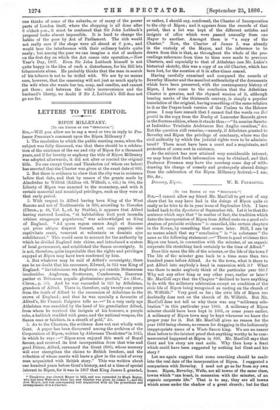LETTERS TO THE EDITOR.
RIPON MILLENARY.
[To THE EDITOR. OF THE "SPECTATOR."]
Sin,—Will you allow me to say a word or two in reply to Pro- fessor Freeman's comment upon the Ripon Millenary ?
1. The resolution to which the public meeting came, when the subject was fully discussed, was that there should be a celebra- tion of the existence of the see and city of Ripon for a thousand years, and if for brevity or euphony the title of Ripon Millenary was adopted afterwards, it did not alter or rescind the original title. No one except Gent and Theakston (of whom see below) has asserted that the Charter was given at the exact date of 886.
2. But there is evidence to show that the city was in existence before that date, and that by reason of the grants made by Alncfridus to Wilfrid (Eddins vit. Wilfridi, c. viii.) in 686, the Liberty of Ripon was annexed to the monastery, and with it certain manorial and municipal privileges, such as they were at that early period.
3. With respect to Alfred having been King of the West Saxons and not of Northumbria in 886, according to Hoveden (Chron., p. 48, Vol. I., ed. by Stubbs), it appears that Alfred having restored London, "et habitabilem fecit post incendia urbium stragesque populornm," was acknowledged as King of England. "Ad einem regem omnes Angli et Saxones qui prius nbique dispersi fuerant, ant cum paganis sine eaptivitate erant, venernnt et voluntarie se dominio ejus subdiderunt." This would seem to account for the authority by which he divided England into shires, and introduced a system of local government, and established the Saxon sovereignty. It is not, therefore, quite improbable that the rights and privileges enjoyed at Ripon may have been confirmed by him.
4. But whatever may be said of Alfred's sovereignty, there can be no doubt that his successor, Edward, in 924 was King of England. " Invictissimus rex Anglorum qui cunctis Britanniam incolentilus Anglorum, Scottorum, Cambrornm, Danornm parker et Britonum populis gloriosissime priefait," &c. (Hoy., .Chron., p. 53). And he was succeeded in 925 by Athelstan, grandson of Alfred. There is, therefore, only twenty-one years from the death of Alfred to the succession of Athelstan to the crown of England ; and that he was specially a favourite of Alfred's, Sir Francis Palgrave tells us :—" In a very early age Athelstan was ennobled by the hand of his grandfather Alfred, from whom he received the insignia of his honours, a purple robe, a baldrick studded with gems, and the national weapon, the Saxon sear or falclaion, in a sheath of gold," &c.
5. As to the Charters, the evidence does not rest wholly with Gent. A paper has been discovered among the archives of the Corporation of Ripon, written by Alderman Theakston*in 1615, in which he says :—" Ripon soon enjoyed this mark of Royal favour, and received its first incorporation from that wise and good Prince, Alfred, surnamed the Great (886), whose memory will ever strengthen the claims to British freedom, and the reflection of whose merits will leave a glow in the mind of every man acquainted with British story." This was written about one hundred years before Gent's history, and at a time of special interest to Ripon, for it was in 1607 that King James I. granted, • Theaksion was cleated Mayor in 1615, and was succeeded by Hugh Ripley, who had been Wakeman when tbe new Charter was given by James I., and the Int Mayor, and was comequently well acquainted with all the precedents and arrangements of tie Charter. or rather, I should say, confirmed, the Charter of Incorporation to the city of Ripon; and it appears from the records of that period, that a list was kept of the different articles and insignia of office which were passed annually from one Mayor to another. Amongst them is "a copy of the Charter." Now, the Charter of James L was already in the custody of the Mayor, and the inference to be drawn from this is that, as throughout the whole of the pro- ceedings references from time to time were made to previous Charters, and especially to that of Athelstan (see Mr. Lnkis's historical sketch), this was a copy of an old Charter, which has been lost, for the mention of it in after-times ceased.
Having carefully examined and compared the records of Beverley Minster and the manifest authenticity of the documents which have been preserved, with the contemporary history of Ripon, I have come to the conclusion that the Athelstan Charter is genuine, and the rhymed version of it, although bearing marks of the thirteenth century, is simply a popular translation of the original, having something of the same relation to it as the Prayer-book version of the Psalms to the Hebrew prose. I may here remark that I cannot find the words rex Dei graticl in the copy from the Duchy of Lancaster Records given in the Surtees edition, where it stands thus :—" In nomine Sanctw et Individuai Trinitatis Atelstanus Rex Anglice omnibus," &c. But the question still remains,—namely, if Athelstan granted to Beverley and Ripon the privilege of sanctuary, where was the civil authority by which the judicial rights were to be adminis- tered ? There must have been a court and a magistrate, and protection of some sort in existence.
As the subject has now attained very considerable interest, we may hope that fresh information may be obtained, and that Professor Freeman may have the courtesy some day of with- drawing his charge of comedy and grotesquely absurd doings from the celebration of the Ripon Millenary festival.—I am, Sir, &c ,


































 Previous page
Previous page